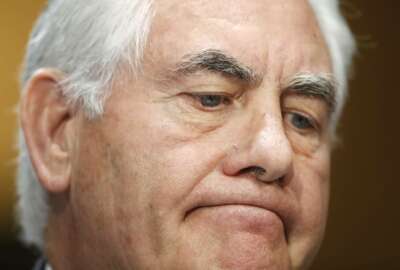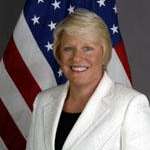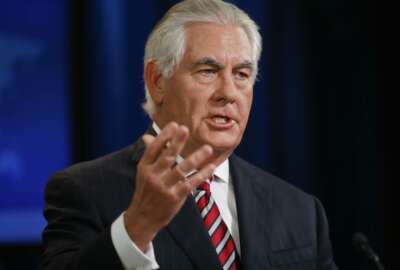

More than 35,000 State Department employees voiced concerns to management about some of the changes being proposed under its agency reorganization.

Amid a dearth of nominations for top leadership posts, a mandate to trim its workforce and the prospect of major budget cuts, State Department employees have had plenty to talk about.
In a recent agency-wide survey, more than 35,000 State Department employees voiced concerns to management about some of the changes being proposed under its agency reorganization. But for Barbara Stephenson, a career diplomat and president of the American Foreign Service Association, not all of the feedback has been negative.
Stephenson told Federal Drive with Tom Temin earlier this month the agency survey, conducted by consulting firm Insigniam, addresses some of the “immense frustration” career employees have had with bureaucratic processes and labor-intensive workarounds.
“Members of the foreign service love their jobs, and they actually want to do them,” Stephenson said. “I see this as a rare opportunity to streamline and get rid of some of these workarounds and return time-to-task so that we’re a more efficient operation.”
Career employees have expressed concerns over the threat of cuts that would force the State Department to shutter or significantly reduce the scope of certain programs. President Donald Trump’s March budget proposal called for a 28 percent decrease in agency funding, but Stephenson said she doesn’t expect funding cuts to be so draconian once Congress approves a budget for fiscal 2018.
“You can’t really talk about cuts of this magnitude without creating a really unsettled feeling,” Stephenson said. “I congratulate my colleagues for doing a very thoughtful look at prioritizing and producing a budget that would’ve worked in those cuts. We would have lost things we cared deeply about. But I also hear loud and clear from both sides of the aisle on the Hill that they have no intention of passing cuts this deep.”
Members of the Foreign Service have also felt the agency’s belt-tightening in terms of its workforce. While the governmentwide hiring freeze has ended for some federal agencies, an Aug. 4 notice on the State Department’s website says its hiring freeze is still in effect. What’s more, the temporary ban on new hires also applies to family member employment.
“At this time, the Department of State’s current hiring freeze guidance remains in effect, including with respect to hiring under a Family Member Appointment (FMA) or Temporary Appointment,” the State Department’s website states. “The Secretary approved an exemption to the hiring freeze that will allow the Department to fill a number of priority [Eligible Family Member] positions that are currently vacant.”
Much like military families, the State Department understands that members of the Foreign Service move often, which limits job opportunities for their spouses. As a result, the significant others of many Foreign Service employees help staff the embassies where they work.
“It was definitely true that embassies and consulates relied heavily on that available pool of labor to get jobs done,” Stephenson said. “Our working estimate is you can hire three eligible family members for the cost of moving one foreign service officer’s post.”
Every summer, one-third to one-half of the Foreign Service rotate out to new posts, including coming back to headquarters in Washington, D.C. Of all the concerns she has heard from members of the Foreign Service, Stephenson said the freeze on family roles has created “a level of concern that’s trumping everything else.”
Secretary of State Rex Tillerson has also been looking at a number of restructuring efforts that could bring in other federal agencies. One serious consideration would be merging the State Department with the U.S. Agency for International Development. A more contentious proposal would move the State Department’s Bureau of Consular Affairs and its Bureau of Population, Refugees and Migration to the Homeland Security Department.
Tillerson has walked back the idea of moving those components to DHS, but Stephenson said those functions are best suited by the State Department’s employees.
“I don’t see how you do better than having the Foreign Service play the role that we play,” she said.
For members of the Foreign Service, that role includes standing at the visa window at embassies and consulates, reviewing prospective refugees’ applications and interviewing them to see what visas they may qualify for. What’s more, those employees have the language skills and understanding of the region to best handle the application process.
“I know how Colombia works, and I understand what Bogata looks like. So I have a good ability to understand what I’m being told and the context, and to make a decision about which Colombians get a visa in their passport,” Stephenson said. “Our real core strength in the foreign service is language ability and mastering what’s going on in that local context. I have a hard time imagining anybody better than us to actually be at the window making that decision.”
Any disruption in that process, such as moving those bureaus to DHS, could create a bottleneck in the visa applications that get processed.
“When we do these changes, it tends to cause disruption and long lines while we’re trying to change over,” Stephenson said. “It’s really important that we keep wait times for visa short.”
Copyright © 2025 Federal News Network. All rights reserved. This website is not intended for users located within the European Economic Area.
Jory Heckman is a reporter at Federal News Network covering U.S. Postal Service, IRS, big data and technology issues.
Follow @jheckmanWFED


